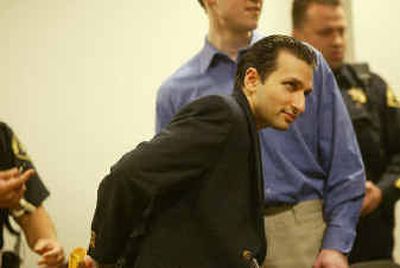Burns, Rafay may get life in prison

SEATTLE — A King County Superior Court jury on Wednesday found Glen Sebastian Burns and Atif Rafay guilty of killing Rafay’s parents and sister in suburban Bellevue in 1994.
Following a six-month trial, each was convicted on three counts of aggravated first-degree murder, concluding a legal odyssey that began when they fled to Canada two days after reporting the deaths.
Because prosecutors agreed not to seek the death penalty in exchange for their extradition from Canada, Burns and Rafay, both 28, face life in prison without parole — the only other possible sentence in Washington for an aggravated murder conviction.
Tariq and Sultana Rafay and their 20-year-old daughter, Basma, were beaten to death with baseball bats on July 12, 1994, four months after they moved from Vancouver, British Columbia, to Bellevue.
Prosecutors said Burns wielded the aluminum bat, while both he and Rafay planned the killings for money. The two were arrested in Vancouver in August 1995, the same month that the family estate, valued at about $300,000, was turned over to Rafay, who had just completed his first year at Cornell University.
Lawyers for Burns, who is Canadian, and Rafay insisted throughout the trial that the two merely found the bodies when they returned from seeing the movie “The Lion King,” and that police had wrongly focused the investigation on them to the exclusion of other suspects.
But Royal Canadian Mounted Police planted bugs in the defendants’ home and car — tactics that would have been illegal in the United States but legal in Canada — and agents posed as gangsters to obtain taped confessions from the two before arresting them.
Canadian authorities refused to send them back to Washington state, however, as long as there was a chance they might face the death penalty. King County Prosecutor Norm Maleng agreed in 2001 that he would not seek their execution, and the two were returned.
The case continued to take bizarre twists, with Burns being assigned new counsel after King County Jail guards reported seeing him having sexual relations with his lawyer, Theresa Olson, in a jail interview room.
She lost her job with the public defense agency she worked for and has been practicing civil law.
The Washington State Bar Association will consider sanctions against her in a hearing this fall. Though she previously admitted having jailhouse sexual contact with Burns, she now denies it.
Burns’ new lawyer, Song Richardson, sought to bar the videotaped confession from trial, citing the RCMP’s tactics. King County Superior Court Judge Charles Mertel allowed it, on the grounds that if the methods were legal in Canada they were admissable under international treaty.
During the trial, Richardson told jurors the undercover officers posed so effectively as gangsters that they thoroughly frightened Burns — then still in his teens — into giving a false confession